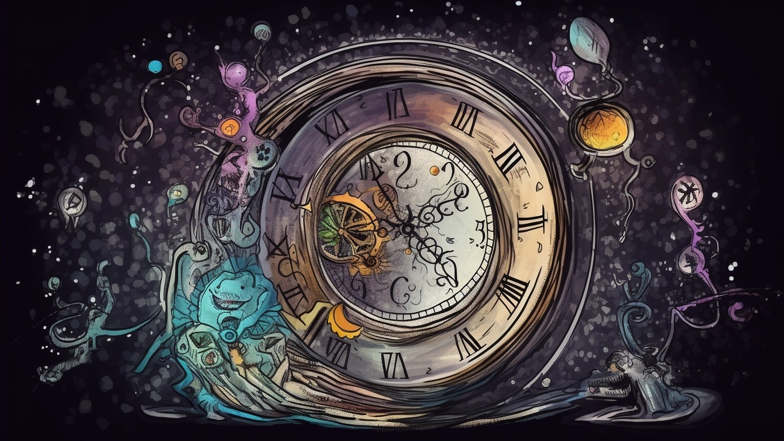
At the heart of this inquiry lies an age-old conundrum: the relationship between time and consciousness. Time is the malleable fabric upon which we weave the tapestry of our existence, while consciousness is the intangible essence that imbues that existence with meaning. Together, these two fundamental concepts shape our experience of reality, creating a continuum of existence that is at once breathtakingly beautiful and impenetrably complex.
At the most basic level, time can be understood as a sequence of events that unfold in a linear fashion. It is the ticking of the clock that marks the passage of hours, the turning of the calendar pages that heralds the arrival of a new year. Yet, our perception of time is far more complex than this simple linear progression suggests. Time can slow down or speed up depending on our perspective. It can be measured in split seconds or eons. It can be both a finite resource and an infinite expanse, depending on how we choose to conceptualize it.
Similarly, consciousness is a concept that defies easy definition. At its most basic, consciousness refers to our subjective awareness of the world around us and the thoughts and feelings that arise within us. It is the spark that animates us, that gives us the drive to explore and understand the universe. Yet, consciousness is a notoriously elusive concept, one that has eluded definitive scientific explanation for centuries.
One of the most intriguing aspects of the relationship between time and consciousness lies in their interconnectivity. Many philosophers and scientists propose that time is inextricably linked to our perception of consciousness. In other words, our experience of time is directly related to our awareness of the world around us. This concept is perhaps best illustrated by the phenomenon of time dilation, which occurs when time appears to slow down or speed up, depending on the speed at which we are moving.
For example, imagine you are on a spaceship traveling at near light speed. To you, time would appear to pass as it always does, but to an outside observer, time would appear to slow down dramatically. This is because the faster an object moves, the slower time appears to pass for that object. This theory has been borne out by numerous experiments, and it has profound implications for our understanding of the relationship between time and consciousness.
One of the most intriguing implications of the concept of time dilation lies in the question of whether time is an absolute quantity. If time can appear to slow down or speed up depending on the observer's perspective, this suggests that time is not an objective quantity but rather a subjective experience. In other words, time may be a construct of our consciousness, a way for us to make sense of the world around us. This idea is echoed in the relativity theory of Albert Einstein, who proposed that time and space are not independent quantities but are instead interconnected, forming a single fabric he called spacetime.
The concept of spacetime has profound implications for our understanding of the universe. It suggests that time is not a linear progression but rather a complex, multidimensional construct that we can only begin to grasp through our subjective awareness. This means that our perception of time is intimately tied to our consciousness, and that our awareness of the world around us is shaped by our experience of time.
Another intriguing aspect of the relationship between time and consciousness lies in the questions it raises about the nature of reality. If time is a construct of our consciousness, does that mean that the universe itself is a construct of our awareness? Many philosophers and scientists have proposed that the universe is, in fact, a hologram, a complex construct of energy and information that is projected by our consciousness. This theory suggests that the universe exists only because we observe it, and that our perceptions of the world around us shape the very fabric of reality.
Of course, this theory is highly controversial and remains the subject of intense debate among scientists and philosophers alike. Yet, it offers a tantalizing glimpse into the intricate relationship between time and consciousness, and it deepens our understanding of the universe and the role human awareness plays in shaping it.
In conclusion, the relationship between time and consciousness is a complex and multifaceted one, and it lies at the heart of our quest to understand the universe and our place within it. From the phenomenon of time dilation to the concept of spacetime to the theory of the holographic universe, our exploration of these two fundamental concepts has led us down a fascinating path of philosophical inquiry that challenges our understanding of the world at every turn.
Ultimately, our perception of time and consciousness is shaped by our subjective awareness, and it is this awareness that imbues our existence with meaning and purpose. Through a deeper understanding of these two fundamental concepts, we can gain a greater appreciation for the beauty and complexity of the universe, and we can gain a deeper understanding of our place within it.
Comments
Post a Comment